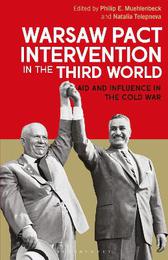
|
Warsaw Pact Intervention in the Third World: Aid and Influence in the Cold War
Paperback / softback
Main Details
Description
It was long assumed that the Soviet Union dictated Warsaw Pact policy in Africa, Asia, the Middle East and Latin America (known as the 'Third World' during the Cold War). Although the post-1991 opening of archives has demonstrated this to be untrue, there has still been no holistic volume examining the topic in detail. Such a comprehensive and nuanced treatment is virtually impossible for the individual scholar thanks to the linguistic and practical difficulties in satisfactorily covering all of the so-called 'junior members' of the Warsaw Pact. This important book fills that void and examines the agency of these states - Czechoslovakia, the German Democratic Republic, Poland, Hungary, Bulgaria and Romania - and their international interactions during the 'discovery' of the 'Third World' from the 1950s to the 1970s. Building upon recent scholarship and working from a diverse range of new archival sources, contributors study the diplomacy of the eastern and central European communist states to reveal their myriad motivations and goals (importantly often in direct conflict with Soviet directives). This work, the first revisionist review of the role of the junior members as a whole, will be of interest to all scholars of the Cold War, whatever their geographical focus.
Author Biography
Philip Muehlenbeck is a professorial lecturer in history at the George Washington University. He is author of Czechoslovakia in Africa, 1945-1968 and Betting on the Africans: John F. Kennedy's Courting of African Nationalist Leaders, as well as editor of several collections. Natalia Telepneva is a post-doctoral fellow at University College London and a member of the international Socialism Goes Global research project team. She completed her PhD at the London School of Economics.
ReviewsThis volume is a major step forward in considering the multiple ways that the Third World ?gured in NSWP policies, and many of the essays weave this story together with the internal machinations of the Pact itself ... It will be an invaluable starting point for anyone who wants to take the Warsaw Pact states seriously as independent actors, and a pointer for future researchers who should start pulling on the threads exposed by these authors. * European History Quarterly *
|